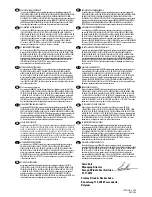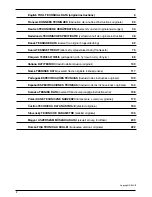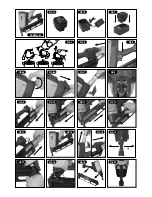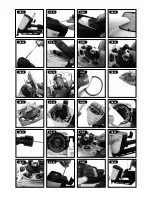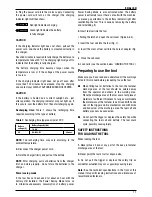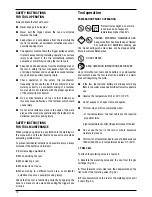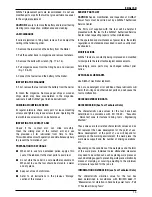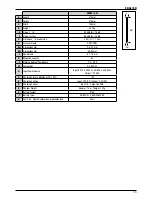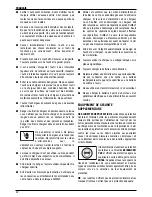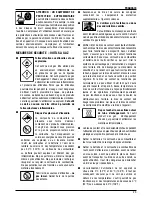
l
Inspection at regular intervals is essential for safety.
Inspect the power tool at regular intervals so that the
tool can be operated safety and efficiently at all times.
l
Avoid dangerous environments. Do not expose the
power tools or charger to rain and do not use the
power tool and charger in damp or wet conditions.
Keep the work area well lit. Never use power tools and
charger near flammable or explosive materials. Do not
use the tool and charger in the presence of flammable
liquids or gases.
l
Store the tool and charger in an idle state. When not
in use, the tool and charger should be stored in a dry,
high or locked-up place – out of the reach of children
and the infirm. Store the tool and charger in a place
where the temperature is less than 40°C.
l
Do not abuse the cord. Never carry the
charger by the cord or yank it to
disconnect it from the mains. Keep the
cord away from heat, oil and sharp edges.
l
When the charger is not in use, or when being
maintained and inspected, disconnect the power cord
of the charger from the mains.
l
To avoid danger, always use only the specified charger.
l
To avoid personal injury, only use the accessories
or attachments recommended in these handling
instructions or in the
D
e
WALT
catalogue.
l
Check and confirm that the supply cord and housing
are not damaged before using the charger. If the supply
cord of this charger or housing is damaged, the charger
must be returned to the
D
e
WALT
authorised service
center for the cord or housing to be replaced. Only
the authorised service center should do these repairs.
D
e
WALT
will not be responsible for any damages or
injuries caused by unauthorised persons attempting to
repair the tool, or mishandling of the tool.
l
To ensure the designed operational integrity of the
power tool and charger, do not remove installed covers
or screws.
l
Always use the charger at the voltage specified on the
nameplate.
l
Always charge the battery before use.
l
Never use a battery other than that specified. Do not
connect a non-tool specific dry cell, or a rechargeable
battery other than that specified or a car battery to the
power tool.
l
Do not use a transformer containing a booster.
l
Do not charge the battery from an engine, electric
generator or DC power supply.
ADDITIONAL SAFETY EQUIPMENT
EYE PROTECTION
which provides protection against flying
particles both from the FRONT and SIDE should always be
worn by the tool operator and others in the work area when
loading, operating or servicing this tool. Eye protection is
required to guard against flying fasteners and debris, which
could cause severe eye injury. The employer and/or user
must ensure that proper eye protection is worn.
Eye protection in accordance with
89/686/EEC
, and with equal or greater
grade than defined in
EN166
should be
used. However all aspects of the
operators work, environment and other
type/s of machinery being used should also be considered
when selecting any personal protection equipment.
Note:
Non-side shielded spectacles and face shields alone
do not provide adequate protection.
CAUTION: ADDITIONAL SAFETY PROTECTION
may
be required in some environments. For
example, the working area may include
exposure to noise levels that can lead to
hearing damage. The employer and
user should ensure that any necessary
hearing protection is provided and used by the operator and
others in the work area. Some environments will require the
use of head protection equipment. When required, the
employer and user must ensure that head protection is used.
SAFETY PRECAUTIONS – GAS TOOLS
UN
1950
l
Be careful of ignition and
explosions.
This tool must not be used in a
combustible environment or in the
presence of flammable liquids or
gases. This tool produces hot exhaust
gases that may ignite flammable
materials and produces sparks. Since
sparks may fly during nailing, it is dangerous to use
this tool near lacquer, paint, benzine, thinner, gasoline,
gas, adhesives and similar inflammable substances, as
they may ignite or explode.
Under no circumstances
should this tool be used in the vicinity of such
inflammable material.
UN
1950
l
Explosion and fire hazard.
The fuel cell is an aerosol dispenser with
flammable contents. It is a pressured
container and the propellant will
remain in the fuel cell. Failure to follow
instructions may result in explosion or
fire. Keep the power tool, fuel cells and
battery away from sunshine and from
8
Summary of Contents for DGN9033-XJ
Page 2: ...DGN9033 XJ ...
Page 4: ...3 ...

